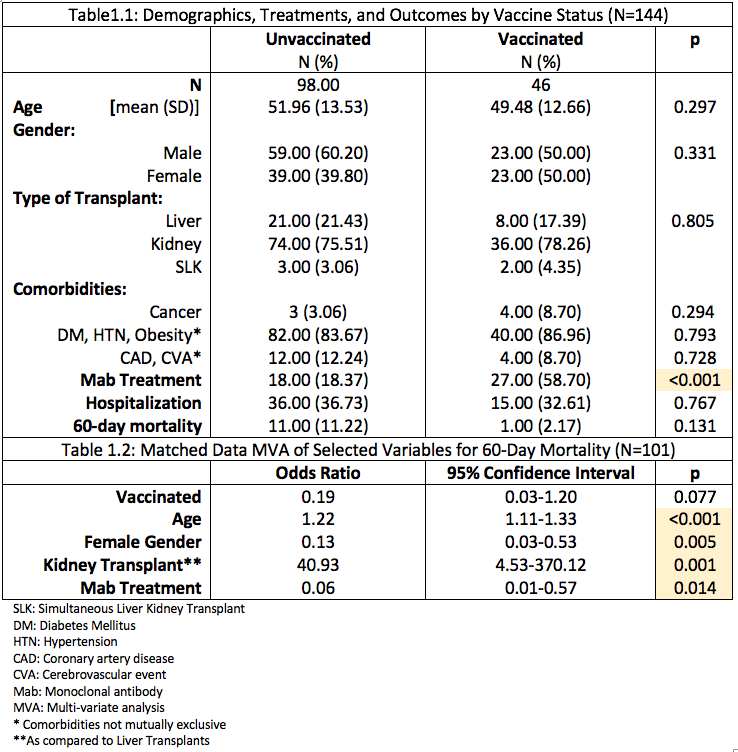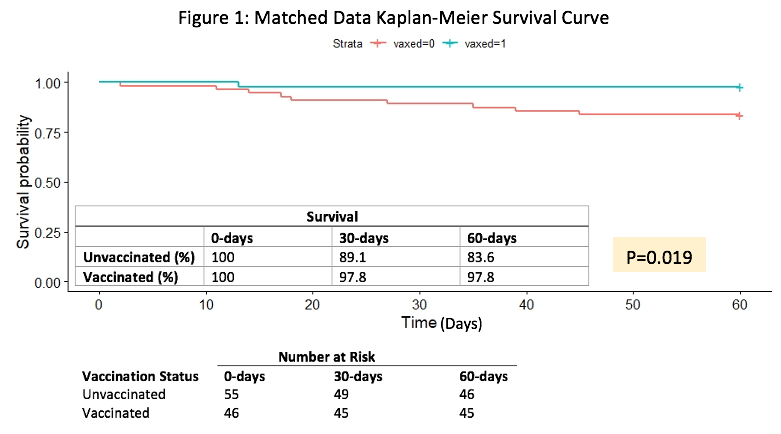COVID-19 mortality in vaccinated vs. unvaccinated solid organ transplant recipients: a single center united states propensity score matching study
Hailey Hardgrave1, Allison Wells2,3, Joseph Nigh 2, Sushma Bhusal 4, Mary K Rude5, Lyle Burdine3, Emmaouil Giorgakis 3.
1College of Medicine, University of Arkansas for Medical Sciences , Little Rock, AR, United States; 2Department of Surgery, University of Arkansas for Medical Sciences , Little Rock , AR, United States; 3Division of Solid Organ Transplantation, University of Arkansas for Medical Sciences , Little Rock, AR, United States; 4Division of Nephrology, University of Arkansas for Medical Sciences , Little Rock, AR, United States; 5Division of Hepatology, University of Arkansas for Medical Sciences , Little Rock, AR, United States
Introduction: Vaccination against COVID-19 has been shown to reduce COVID-19 hospitalization and mortality rates in the general population. Studies in the Solid Organ Transplant (SOT) population report reduced COVID-19 mortality in vaccinated SOT recipients despite concerns over the effect of immunosuppression on vaccine response. Aim of this study was to perform a single center propensity score matching analysis on post COVID-19 survival of consecutive vaccinated and unvaccinated SOT patients who contracted the disease, at a single US academic transplant center.
Method: Study period was 02.2020-02.2022. After obtaining institutional IRB approval, all consecutive COVID-19 positive cases on adult SOT (liver, kidney or simultaneous liver-kidney) recipients were identified and registered on a constructed institutional REDCAP database. Variables captured included patient demographics, comorbidities, immunosuppression, COVID-19 treatment and hospitalization status, COVID-19 vaccination status, and 60-day mortality. Propensity score matching was performed on age and gender for completed vaccination status at time of infection. Multivariable and survival analysis were constructed from this matched data.
Results: 144 SOT patients were diagnosed with COVID-19. 98 were unvaccinated and 46 vaccinated. Mortality in unmatched data was 11.2% (N=10) and 2.2% (N=1) in unvaccinated and vaccinated groups respectively (table 1.1). Propensity score matching with adjustment reduced the study population to N=101. Multi-variant analysis for 60-day mortality for matched data identified age (OR 1.22, P<0.001) and post-kidney transplant status (OR 40.93, P=0.001) to significantly increase 60-day mortality odds (table 1.2), contrary to female gender (OR 0.13, p=0.005) and monoclonal antibody treatment (OR 0.06, p=0.014). Matched data Kaplan-Meier survival curve showed lower post-infection survival in the unvaccinated group [(30 days; vaccinated vs. unvaccinated 97.8% vs. 89.1%, respectively) (60 days; 97.8% vs. 83.6%, respectively) (p=0.019)] (figure 1). Majority of deaths for both vaccinated and unvaccinated groups occurred between 0 and 30 days (N=7 unvaccinated, N=1 vaccinated).
Discussion: In agreement with previously published reports, advancing age and post-kidney transplant status significantly impacted COVID-19 mortality, while monoclonal antibody treatment significantly decreased mortality, irrespective of vaccination status. Post COVID-19 matched data survival analysis demonstrated inferior survival in the unvaccinated group. Despite the limited sample size, this propensity score matching study supports the protective effect of COVID-19 vaccination on SOT recipients.



right-click to download
